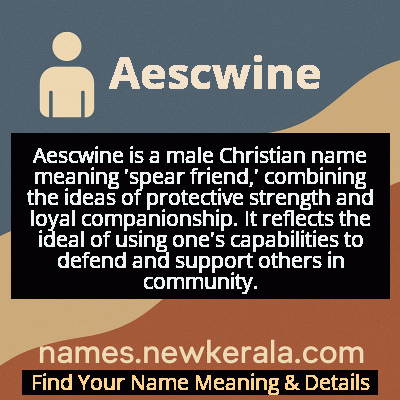Aescwine Name Meaning & Details
Origin, Popularity, Numerology Analysis & Name Meaning of Aescwine
Discover the origin, meaning, and cultural significance of the name AESCWINE. Delve into its historical roots and explore the lasting impact it has had on communities and traditions.
Name
Aescwine
Gender
Male
Origin
Christian
Lucky Number
7
Meaning of the Name - Aescwine
Aescwine is a male Christian name meaning 'spear friend,' combining the ideas of protective strength and loyal companionship. It reflects the ideal of using one's capabilities to defend and support others in community.
Aescwine - Complete Numerology Analysis
Your Numerology Number
Based on Pythagorean Numerology System
Ruling Planet
Neptune (Ketu)
Positive Nature
Intuitive, analytical, spiritual, and inquisitive.
Negative Traits
Secretive, reserved, aloof, and can be overly critical.
Lucky Colours
Green, yellow.
Lucky Days
Monday.
Lucky Stones
Cat’s eye, moonstone.
Harmony Numbers
1, 5, 6.
Best Suited Professions
Scientists, researchers, spiritual leaders, detectives.
What People Like About You
Depth of knowledge, analytical skills, spirituality.
Famous People Named Aescwine
Æscwine of Wessex
Anglo-Saxon King
Ruled as King of Wessex around 674-676 AD during the early Christianization of England
Æscwine of Essex
Anglo-Saxon Noble
Early Christian ruler of Essex who helped establish Christian communities in southeastern England
Aescwine the Missionary
Christian Missionary
Traveled with St. Boniface to convert Germanic tribes and establish monastic communities
Name Variations & International Equivalents
Click on blue names to explore their detailed meanings. Gray names with will be available soon.
Cultural & Historical Significance
During the Christianization period, such names symbolized the integration of traditional Germanic virtues with Christian ideals. Aescwine appears in historical records of kings who ruled during crucial moments of religious transition, serving as bridges between old and new belief systems. The name's persistence in Christian contexts demonstrates how early English Christians adapted rather than abandoned their cultural heritage, creating a unique synthesis that would define English Christianity for centuries. This cultural significance makes Aescwine more than just a personal name—it's a historical artifact representing England's complex religious and cultural transformation.
Extended Personality Analysis
Individuals named Aescwine are typically characterized by a unique blend of strength and sociability. The 'spear' element of the name suggests qualities of protection, direct action, and strategic thinking—these individuals often approach challenges head-on with practical solutions and clear determination. They tend to be natural leaders who aren't afraid to take charge in difficult situations, possessing both the courage to make tough decisions and the resilience to see them through. This martial aspect is balanced by a strong sense of responsibility rather than aggression.
The 'friend' component brings relational depth to this personality profile. Aescwines typically value loyalty above all else, forming deep, lasting bonds with family, friends, and community. They're often described as trustworthy confidants who balance their strength with empathy and diplomatic skill. This combination makes them particularly effective in roles requiring both authority and compassion—they can command respect while maintaining genuine connection with others. Their leadership style tends to be inclusive rather than authoritarian, using their capabilities to empower and protect those around them rather than to dominate.
Modern Usage & Popularity
In contemporary naming practices, Aescwine is exceptionally rare and primarily appears in specific contexts: among families with strong Anglo-Saxon heritage, historical reenactment communities, and academic circles focused on medieval studies. The name saw a minor revival during the 19th century Victorian era when interest in Anglo-Saxon history peaked, but it never achieved widespread popularity. Today, most usage is symbolic or ceremonial rather than practical, with parents who choose this name typically valuing historical continuity and linguistic heritage. The name's complexity and unfamiliar spelling to modern eyes make it challenging for everyday use, leading many to prefer simplified variants like Ashwin or Ashton that preserve some phonetic and symbolic elements while being more accessible in contemporary society. Its current usage trend remains stable but minimal, primarily confined to enthusiasts of early English history and culture.
Symbolic & Spiritual Meanings
Symbolically, Aescwine embodies the powerful concept of 'strength in community.' The spear represents not just weaponry but the broader ideals of protection, authority, and the ability to overcome adversity—it symbolizes the capacity to defend what matters and make decisive interventions when necessary. Meanwhile, the friendship element transforms this strength from solitary power into communal benefit, representing the ideal that true strength exists to serve and protect relationships. The specific use of ash wood in the original meaning adds layers of symbolism: ash trees represent resilience, connection between different realms (in Germanic mythology), and the idea that strength grows from deep roots and natural foundations. Metaphorically, the name suggests someone who understands that real power lies in using one's capabilities to build and safeguard community rather than to dominate individually.

